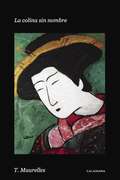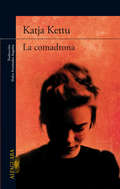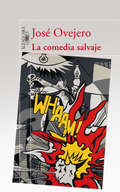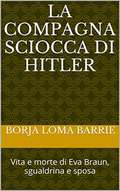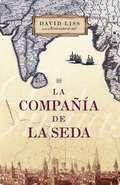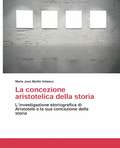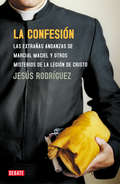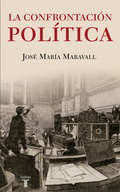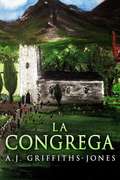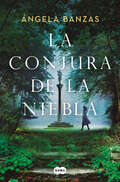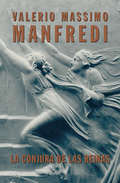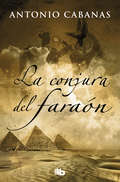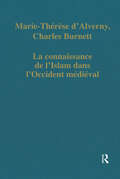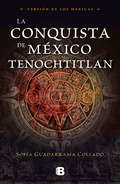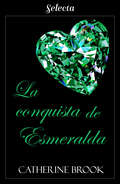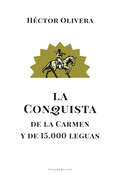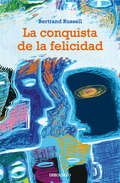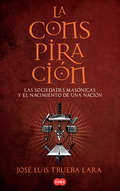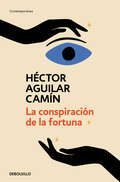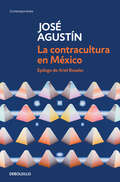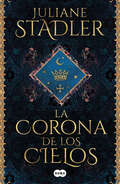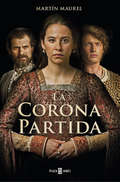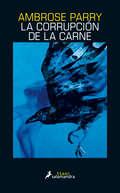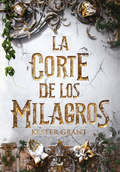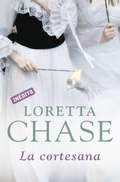- Table View
- List View
La colina sin nombre
by T. MaurellesAfortunados aquellos que murieron en las batallas. A nosotros nos quedó la derrota. Y desde entonces formamos un ejército de sombras hasta el final de nuestros días. <P><P>El país del sol naciente. Japón. Personajes atrapados por su pasado que buscan sin descanso su redención y la paz. La acción se desarrolla en su mayor parte en un país y una sucesión de acontecimientos históricos determinados, pero los sentimientos que recorren sus páginas son universales: la búsqueda de la justicia, el honor, el respeto, la amistad, el amor, la soledad, el valor de la palabra dada. <P><P>Es una historia con la que el lector descubrirá que, a veces, las cosas no son lo que parecen. Yo he escrito esta historia, tú tendrás que imaginarla, hacerla tuya en ese viaje mágico que ocurre cuando lees. Gracias por compartirlo. Cuando abres un libro, lo traes a la vida. <P><P>Nota del Autor: esta es una novela de ficción, pero los acontecimientos, datos, lugares y personajes reales que aparecen son de público conocimiento y pueden ser confirmados en multitud de fuentes.
La comadrona
by Katja KettuÉrase una vez FinlandiaTraducida a catorce idiomas«Una gran novela. Una historia de amor aderezada con una pizca de realismo mágico y un puñado de durísimas verdades... Kettu sirve un plato de entrañas bien caliente: aterrador y fascinante.» Jurado del Premio RunebergLaponia, 1944: hasta los rincones más inhóspitos de Finlandia llegan los ecos de la Segunda Guerra Mundial. Por las venas de la comadrona fluye la sangre de un padre comunista salvajemente represaliado. Desde su infancia vive aislada de una sociedad que la desprecia. Pero su mundo sufre un vuelco cuando un enigmático oficial alemán de las SS la descubre con un cordón umbilical entre los dientes: es la primera vez que alguien la mira de verdad. Su amor la impulsa a seguir a Johannes hasta el campo de prisioneros al que ha sido enviado y más allá. Hasta la muerte si es necesario.La crítica ha dicho:«La ferocidad del amor podría ser un buen título para la novela de Katja Kettu. Todo es feroz en este libro, también el estilo. Un libro que no se olvida, gélido e incandescente, brutalmente pasional.» Marilia Piccone, Wuz.it (Italia)«Una novela asombrosa, con un alma descarnada y una energía liberadora. No me sorprendería que acabara convirtiéndose en un clásico.»Cecilia Nelson, Göteborgs-Posten (Suecia)«Sorprendentemente maravillosa... Una increíble experiencia de lectura.»Turun Sanomat (Finlandia)«Una descripción cruda y desnuda de qué puede hacer la guerra con el ser humano y dónde puede llevarte el amor.» Adresseavisen (Noruega)«Puedo afirmar que tengo entre las manos uno de los libros más exitosos e importantes del año. Me atrevo a compararlo con Purga, de Sofi Oksanen. Así de grande es.»Seppo Puttonen, Ykkösen Aamu-tv (Finlandia) «Una obra maestra.»Raili Kettunen, Kotimaa (Finlandia)«Una de las novelas más profundas que he leído en mucho tiempo... Rebosa sensualidad y nostalgia. Es hipnótica, no puedes apartarte de ella.»Annina Rabe, Svenska Dagbladet (Suecia)«No es un libro que se lea, es un libro que se vive hasta el último aliento. Es imposible salir indemne de él.» Dagens Nyheter (Suecia)«Leer La comadrona es una experiencia asombrosa, que oscila entre el horror y el fervor.»Smålandsposten (Suecia)«Impresionante por su tono, por la trama, por el lenguaje... Una historia que llega a todos los confines, de la tierra y de la humanidad. Un libro fascinante.» Marie-Paule Caire, Parutions.com (Francia)
La comedia salvaje
by José OvejeroBenjamín ha recibido una misión que se le antoja desmesurada: detener la Guerra Civil. Aunque Benjamín no cree que sea posible, recorrerá un país que se ha lanzado, al parecer con entusiasmo, a su propia destrucción. Y de camino irá encontrando estrambóticos personajes, apariciones delirantes que le harán pensar que se ha vuelto loco. Menos mal que ahí está la mano de Julia para devolverle de vez en cuando a la realidad. Esta novela es un disparate. Un mundo de alucinación, en el que las escenas realistas conviven con sucesos imposibles, aunque nunca se sabe si las situaciones más esperpénticas están sacadas de la realidad o de la imaginación del escritor. En La comedia salvaje no hay héroes ni biografías ejemplares. Más que un libro sobre la Guerra Civil, éste es un libro sobre la guerra, sobre todas las guerras. Las voces de Cervantes, Valle-Inclán y Kurt Vonnegut, resuenan en esta novela que es, también, una reflexión lúdica sobre la utilidad de la literatura.
La compagna sciocca di Hitler. Vita e morte di Eva Braun, sgualdrina e sposa
by Corrado Pastore Borja Loma BarrieRomanzo storico. Biografia di Eva Braun, moglie di Adolf Hitler. Racconto di come si conobbero Hitler e Eva. La sessualità di Hitler. La vita quotidiana di Hitler. Hitler sconosciuto. La psicologia di Hitler.
La compañía de la seda
by David LissDavid Liss, ganador del prestigioso premio Edgar, sorprende con una magnífica novela, protagonizada por un peculiar investigador que debe desentrañar un complot en torno al comercio de la seda con las colonias británicas de ultramar.Londres, 1722. En la época de apogeo del mercado de importación de seda y especias, Benjamin Weaver, judío de extracción humilde, ex boxeador y cazarrecompensas, se ve acorralado por el excéntrico y misterioso millonario Cobb para que investigue en su provecho. Muy pronto Weaver se ve sumergido en una maraña de corrupción, espionaje y competencia desleal cuyo trasfondo son los más oscuros intereses económicos y comerciales. Una vez más, el renombrado autor David Liss combina su profundo conocimiento de la historia con la intriga. Evocadoras caracterizaciones y un cautivador sentido de la ironía sumergen allector en una vívida recreación del Londres de la época y componen un colorido tapiz del comercio con las colonias, las desigualdades sociales y la picaresca de aquellostiempos.
La concezione aristotelica della storia
by María José Martín VelascoNei paesaggi conosciuti della Poetica (Po. 1451a36-b11 e 1459a17-32) Aristotele rifiuta in anticipo la possibilità di fare la scienza della storia. La storia intesa come l'investigazione dei fatti umani è considerata una fase anteriore alla conoscenza scientifica che, per sua propria naturalezza, non può arrivare ad essere oggetto di generalizzazione. Queste affermazioni contrastano con il fatto che Aristotele si dedicasse durante tutta la sua vita al lavoro di investigazione storica, della quale conserviamo delle ampie referenze da altri autori e delle allusioni nelle sue opere, specialmente nella Politica, nella Retorica e nei trattati di etica. E' per questo di grande importanza studiare in che modo Aristotele si avvicina a tutta questa informazione e qual' è il trattamento che si fa di questa nel complesso della sua filosofia.
La confesión
by Jesús RodríguezEn septiembre de 1946, un sacerdote mexicano de 26 años, con un pasado oscuro, escasa formación teológica y sueños de grandeza, desembarcaba en España con apenas 30 seguidores.Marcial Maciel Degollado se decía un instrumento de Dios y acababa de fundar en su país una congregación religiosa profundamente tradicional y reaccionaria con el épico nombre de Legionarios de Cristo. Cuarenta años más tarde se había convertido en uno de los puntales del papado de Juan Pablo II, amo y señor de un inmenso complejo religioso-industrial, y soñaba con subir a los altares. Pero Maciel era en realidad un pederasta, ladrón, polígamo y morfinómano, que ocultaba sus crímenes tras una red de múltiples vidas y personalidades.Jesús Rodríguez ha buceado en esa vida de crímenes y milagros, desde sus seminarios y universidades en España e Italia hasta sus fuentes de financiación en su feudo mexicano; se ha entrevistado con sus fieles y sus adversarios; con los que le dieron todo y a los que arrebató todo. Ha buscado la verdad siempre en pos de desentrañar el misterio de Maciel y los legionarios de Cristo.
La confrontación política
by José María MaravallUn texto imprescindible para entender la política en las democracias, así como los fundamentos del gobierno representativo. Sólo un autor del perfil de Maravall, que combina una importante labor investigadora y docente como catedrático de Sociología y una larga experiencia política, puede ofrecer un enfoque tan completo.Este libro estudia estrategias de los políticos para detentar el poder y disponer de autonomía respecto de los ciudadanos. <p><p> La primera cuestión analizada es la de la crispación y sus consecuencias sobre la política democrática. ¿Por qué razones unos políticos rechazan estrategias de convergencia y moderación, en busca del voto de la mayoría, y optan por una polarización radical de la competición electoral? <p>La segunda cuestión consiste en las razones por las que se anticipan las elecciones. El momento en que éstas se celebran constituye una decisión discrecional de los primeros ministros en la mayoría abrumadora de las democracias parlamentarias. ¿Cómo cabe explicar este adelanto? ¿Qué efecto tiene en los resultados electorales que los primeros ministros decidan cuándo se van a someter al juicio de los ciudadanos? <p>La tercera cuestión se refiere a las razones por las que los primeros ministros pierden el poder. Con mucha frecuencia, esto no se debe a derrotas electorales sino a conspiraciones. ¿En qué medida votantes y políticos coinciden en sus criterios al echar a un primer ministro? ¿De qué recursos dispone éste para hacer frente a las conspiraciones? ¿Cómo afecta todo ello a los intereses de los ciudadanos?
La congrega
by A.J. Griffiths-Jones Laura ContradaIl reverendo Archibald Matthews è appena stato riassegnato ad una nuova congrega in una nuova città. Il suo carattere cinico e schivo, eredità di un passato travagliato impossibile da superare, verrà messo a dura prova da una governante premurosa, un vescovo esuberante ed uno stuolo di fedeli particolarmente impegnativi. La sua fiducia nell'umanità, infatti, sembra crollare quando scopre il diario del suo predecessore, in cui l'uomo ha annotato appunti piuttosto compromettenti sui suoi nuovi concittadini. Tra bugie e reticenze, riuscirà Archie a scoprire chi nasconde il segreto più grande di tutti?
La conjura de la niebla
by Ángela BanzasDespués del éxito de El silencio de las olas, Ángela Banzas regresa con una novela vibrante que mezcla superstición y leyendas gallegas con una investigación y un secreto familiar «Siempre supo que iba a suceder. No sabía cómo ni tampoco cuándo, pero sabía que el mal vivía en la niebla y se alimentaba del pueblo». La desaparición de una adolescente sacude la pequeña localidad de Illa de Cruces. Allí la jueza Elena Casáis se hará cargo de la instrucción del caso pese a ignorar que ese suceso está conectado con la desaparición de la hermana de su madre, su tía Melisa. Un misterio de hace treinta años del que una mujer ingresada en un psiquiátrico y el viejo curandero de la isla guardarán las claves para resolverlo. Después del éxito de El silencio de las olas, Ángela Banzas construye una historia vibrante en la que crímenes, intrigas y secretos familiares conviven con creencias y supersticiones populares bajo el telón de fondo de la Ría de Arousa. Un paisaje gallego protagonizado por el mar y un frondoso bosque de laureles en donde cruceiros de piedra custodian terribles secretos que la niebla quiere ocultar. Instagram: angelabanzas Natural de Santiago de Compostela, es licenciada en Ciencias Políticas y de la Administración por la Universidad de Santiago y MBA por la Escuela Europea de Negocios de Madrid. Su trayectoria profesional ha estado siempre ligada a la consultoría de Administración Pública. Su primera novela, El silencio de las olas (Suma de Letras, 2021), obtuvo un gran éxito de público y ventas. La conjura de la niebla es su segunda novela. Sobre El silencio de las olas se ha dicho:«Un maravilloso viaje a un pasado de historias entrelazadas, prosa exquisita y misterios a flor de piel».María Reig, autora de Papel y tinta «Parafraseando Elhalcón maltés, esta novela está hecha del mismo material con que se tejen los sueños. Le auguro todos los éxitos».Xurxo Fernández, El Correo Gallego
La conjura de las reinas
by Valerio Massimo ManfrediEl duelo y la desgracia enturbian el regreso de los aqueos tras la caída de Troya. Agamenón muere a manos de Egisto y Clitemnestra. Áyax es víctima de la ira de Poseidón. Ulises emprende su interminable periplo. Y Diomedes, traicionado por su esposa, en quien adivina la venganza de Afrodita, abandona Argos con sus hombres en busca de una nueva patria. Los dioses no olvidan las ofensas... Y ni la conquista de la paz y de un nuevo reino impedirá que la tragedia se cierna sobre el último héroe homérico.
La conjura del faraón
by Antonio CabanasAntonio Cabanas, autor de El ladrón de tumbas, presenta en esta novela una ambiciosa historia basada en los entresijos de la alta política y la maquinaria judicial del Antiguo Egipto. Nefermaat, nacido y criado en la corte del faraón, es testigo y víctima de una conjura urdida en palacio que le llevará a situaciones sorprendentes. Bajo la protección de la diosa Sejmet, el joven Nefermaat se convierte en un médico afamado. Gracias a sus estudios y a los conocimientos que Anon, un babilonio sabio y peculiar, le proporciona, el protegido de Sejmet consigue aliviar los dolores de los más altos dignatarios. Pero el amor y la rectitud de corazón lo arrastran al exilio y casi a la muerte, en una aventura cuyo principal protagonista es la historia misma de Egipto y, más concretamente, el levantamiento de la reina Tiy contra su marido, el faraón Ramsés III.
La connaissance de l'Islam dans l'Occident médiéval (Variorum Collected Studies)
by Charles Burnett Marie-Thérèse d'AlvernyThis volume, the second in the series of Marie-Thérèse d’Alverny’s selected articles to be published by Variorum, gathers the majority of her studies on the understanding of Islam in the West from the early Middle Ages until the mid-13th century; some related works will be included in a further selection. In the 12th century, as she shows, a serious effort was for the first time made to learn something of the reality behind the fabulous and scurrilous stories about Muhammad and Islam. A collection of translations from Arabic, including the Koran, was commissioned in 1140 by Peter the Venerable of Cluny, and d’Alverny found the manuscript in which his secretary wrote these out. This discovery led her to explore other translations into Latin of the Koran and other Islamic texts, to identify the work of the translators Hermann of Carinthia, Robert of Ketton and Mark of Toledo, and to depict the milieu in which this work was possible.
La conquista de México Tenochtitlan: Versión de los mexicas
by Sofía Guadarrama ColladoEdición conmemorativa. 500 años de la conquista. La presente edición conmemorativa es una recopilación de las últimas tres novelas de la heptalogía Grandes Tlatoanis del Imperio, escrita por Sofía Guadarrama Collado, autora de la trilogía que ha vendido más de 100 000 ejemplares, Enigmas de los dioses del México antiguo. El 8 de noviembre de 1519 Hernán Cortés entró por primera vez a la ciudad isla de México Tenochtitlan en compañía de 450 europeos y aproximadamente 6,000 soldados tlaxcaltecas, cholultecas, huexotzincas y totonacas. A 500 años del suceso que cambió por completo la historia del Imperio mexica y todo el continente americano, Sofía Guadarrama Collado entrega al lector La Conquista de México Tenochtitlan, versión de los mexicas. Una novela que nos acerca al otro lado de la historia -colocando a los conquistadores en un plano muy distante- y nos ayuda a comprender a través de los ojos de Moctezuma, Cuitláhuac y Cuauhtémoc lo que ellos mismos ignoraban y lo complejo que fue vivir la inesperada aparición de una raza de hombres, animales, armamento, lengua, costumbres, religión y una monarquía aterradoramente desconocidos.
La conquista de esmeralda (Joyas de la nobleza #Volumen 4)
by Catherine BrookLlega la cuarta entrega de la serie «Joyas de la nobleza» con la historia de Esmeralda. El único hombre que no podía amarla era el único al que ella deseaba. Esmeralda Loughy tiene un solo objetivo: encontrar al hombre de su vida y casarse con él. El hombre perfecto tiene que ser un caballero simpático, alegre, romántico, fiel y, sobre todo, que la quiera tanto como lo querrá ella. Sabe que lo reconocerá en cuanto lo vea# Y así sucede, aunque hay un pequeño problema: no tiene ninguna de las cualidades anteriores, y ni siquiera cree en el amor. Esmeralda no se dará por vencida, es una Loughy, y las Loughy son tercas. Ella está dispuesta a enamorarlo y a tener su final feliz de novela. Anthony Price, barón de Cliffton, es un paria en la sociedad londinense. Su horrible reputación hace que los caballeros tiemblen cuando lo ven, las madres alejen a sushijas de él y las mujeres casadas suspiren ante su aura de peligro. Después del abandono de su madre, la rabia de su padre y la muerte de su prometida hace años está convencido de que no nació para ser amado, por ello, se dedica a destruir literalmente su vida. Alcohol, juegos, mujeres, y aventuras forman parte de su cotidianidad, y no está dispuesto a cambiar... O no lo estaba al menos hasta que esa entrometida muchacha se interpuso en su camino. Con esos ojos verdes llenos de la inocencia de quien no ha sufrido en la vida y ese carácter tan optimista, ella se dedicará a perseguirlo poniendo en peligro su corazón y también la reputación que tanto se ha esforzado en fomentar.
La conquista de la Carmen y de 15.000 leguas
by Héctor OliveraLa primera novela de uno de los narradores más importantes del cine argentino del siglo XX, propone el pasional relato del amor imposible entre una joven y bella cautiva devenida cuartelera y un sargento del ejército nacional, ambientado en el convulsionado escenario del país a lo largo de la década de 1870, la de la peste, la lucha contra el indio y la construcción de una nación bajo el liderazgo militar del general Roca. En una aciaga noche de 1871, un malón arrasa con la hacienda de los Arrieta y el capitanejo toma cautiva a la adolescente Carmen, quien es violada y amancebada por su captor. En la toldería la muchacha coincide con el capitán Martín Cabral, que está parlamentando con el cacique de la tribu, y se produce un flechazo que es el inicio de un amor imposible entre un oficial y una cuartelera. Cuando tiempo después se reencuentran, él en un fuerte y ella en el lindero rancherío de las chinas, empiezan una relación clandestina que -al igual que otras situaciones pasionales- es narrada con extrema crudeza. Al leer un comentario de Arturo Pérez-Reverte -"escribo historias donde pasan cosas"-, el autor se dijo a sí mismo: "Eso es lo que yo he hecho a lo largo de toda mi vida profesional: escribir argumentos y guiones de cine y televisión". En este caso se trata de su primera novela, que en la ficción crea los mundos y los encuentros y desencuentros de Carmen y Martín, enriqueciendo el relato con la pintura de hechos históricos que van desde la epidemia de fiebre amarilla hasta la mal llamada Conquista del Desierto y la consiguiente presidencia del hoy polémico general Julio A. Roca, forjador del comienzo de medio siglo de grandeza de la República Argentina.
La conquista de la felicidad (Nueva Austral Ser. #Vol. 189)
by Bertrand RussellLa felicidad ¿es un estado o una búsqueda? Esta obra afirma que lo segundo: el ser humano se debe mostrar activo en la eliminación de las trabas al despliegue de la felicidad, comenzando por eliminar esas pasiones egocéntricas que son la envidia, el miedo o la conciencia de pecado y reforzando las que impulsan hacia fuera de sí mismo, que invitan a sentirse parte de la corriente de la vida: «Cuantas más cosas interesen a alguien, más oportunidades de felicidad tendrá», afirma, para concluir que el ser feliz es el que se siente ciudadano del universo "y goza libremente del espectáculo que le ofrece y de las alegrías que le brinda". Una obra de autoayuda... si no fuera porque se trata de un proyecto, de raigambre estoica, de repensar el ser humano y su posición en el mundo.
La conspiración
by José Luis Trueba LaraLas sociedades masónicas y el nacimiento de una nación. Una novela histórica documentada con precisión, que saca a la luz los nexos entre distintos grupos secretos y personajes como Agustín de Iturbide, Nicolás Bravo, Vicente Guerrero, Antonio López de Santa Anna, logrando un fiel retrato del nacimiento de México, entre conjuras políticas, asesinatos y secretos que dan pie a La conspiración. 1824. Después de once años y once meses de una guerra sangrienta, por fin se firman los tratados que reconocen la Independencia de México y el Ejército de las Tres Garantías marcha triunfante en la capital del país, con Agustín de Iturbide a la cabeza. Sin embargo, la paz sólo es aparente: el país vive una era de revueltas, conjuras, luchas entre antiguos generales, convulsiones políticas. Todos quieren tener el poder entre sus manos y para lograrlo se valdrán de asesinatos, golpes de estado, conspiraciones, trampas políticas..., al mismo tiempo que la nación intenta construir su identidad y salir adelante. En este contexto, llegan las distintas logias de masones, apoyadas por los gobiernos de Estados Unidos y Europa, con el objetivo de intervenir en la dirección política de México. Las antiguas batallas entre realistas e insurgentes terminan por convertirse en enfrentamientos velados entre los distintos grupos masónicos: los escoceses contra los yorkinos.
La conspiración de la fortuna
by Héctor Aguilar CamínEl ascenso y la caída de Santos Rodríguez retratan a la clase dirigente mexicana y las trastiendas del poder; una trama donde la ambición, la vanidad y la miseria moral campan a sus anchas. En el juego de la vida, o del destino, la gente no llega tan lejos como augura su talento sino como permiten sus limitaciones. Así da inicio, memorablemente, La conspiración de la fortuna, novela con la que Hector AguilarCamin vuelve al lugar de sus ficciones fundadoras: Morir en el golfo y La guerra de Galio. Esta obra, cargada de esencia política y de símbolos, cuenta la historia de Santos Rodriguez, un hombre de genio perdido en la elección de su destino. El destino juega con él y él con sus sueños, ambos con sus pasiones, sus hijos, sus mujeres, su país.
La contracultura en México (Edición de aniversario): La historia y el significado de los rebeldes sin causa, los jipitecas, los punks
by José AgustínUna audaz radiografía sobre los movimientos contraculturales en México en voz de uno de sus mayores exponentes. "190 páginas llenas de salvajes historias de rebeldía, ingenuidad, incorrección, desmadre, lucidez, arte, literatura, drogas, punks, darketos, jipitecas, cholos, chavos banda, sexo y rockanroll. Pero sobre todo, [este libro] reivindica la dignidad de no estar de acuerdo con "el poder" y la vigencia de esa entelequia que se llama 'contracultura'" -Carlos Martínez Rentería, fragmento del prólogo- La contracultura en México se desplaza entre varios géneros, cubriendo los grandes movimientos y las manifestaciones contraculturales más importantes que ha tenido nuestro país, tales como los pachucos, los existencialistas, las pandillas juveniles o el rockanroll. En esta obra alucinante, el autor también da cuenta de las expresiones juveniles que han incidido en la música, la literatura, el teatro, el cine, la gráfica, la televisión y las publicaciones. El lector hallará excelentes herramientas para analizar la realidad, así como datos indispensables para leer y comprender los tiempos y las manifestaciones que han enfrentado a la cultura predominante. Otros autores han opinado: "Fue el primer escritor que incorporó recursos de la cultura de masas y contracultura a la literatura mexicana: las onomatopeyas de los cómics, el montaje cinematográfico, las acotaciones teatrales y el mundo interior de la psicodelia" -Juan Villoro- "Cuando un escritor logra identificarse con los jóvenes de cualquier época, trasciende el momento en el que escribió su obra, porque la juventud tiene más o menos las mismas características. Ése es el secreto de que las novelas de Agustín hayan sobrevivido y sigan siendo leídas por los jóvenes en la actualidad" -Enrique Serna- Fragmento del epílogo: "No sé bien si en estas páginas encontrarán las respuestas que buscan [...] pero de lo que estoy seguro es que además de informarse de lo que sucedió con el rock, los jipitecas, los alucinógenos y todo lo subsecuente, van a gozar esta crónica escrita a través de una prosa rodante y antisolemne que no ha perdido un ápice de su frescura original" -Ariel Rosales-
La corona de los cielos
by Juliane StadlerEl esplendor de la Edad Media, la violencia de las Cruzadas, el poder del amor. «Meticulosamente documentada y escrita con garra. ¡La épica La corona de los cielos de Juliane Stadler es una novela histórica en una categoría propia!».Daniel Wolf, autor de La sal de la tierra Francia, 1189. Aveline, hija de un artesano, decide unirse a la Tercera Cruzada con la esperanza de conseguir la absolución para un grave pecado. Haciéndose pasar por un arquero llamado Avery en el ejército del emperador Barbarroja, cae herida en Acre, la ciudad que da entrada a Tierra Santa, defendida con uñas y dientes por los hombres de Saladino. Aveline confía entonces su secreto a Étienne, aprendiz de cirujano e hijo repudiado de una noble familia. Pero cuando el amor surge entre ellos, los jóvenes se dan cuenta de que su pasado por fin les ha alcanzado... y de que su peor enemigo no se encuentra entre los sarracenos, sino entre sus propias filas. La crítica ha dicho:«Una novela medieval apasionante».Rhein-Neckar-Zeitung «El estilo cautivador y tridimensional de la escritura te hace sentir como si hubieras sido transportado a la Edad Media y te identificaras a la perfección con las vicisitudes de la época».Münsterland Zeitung «¡Por fin otra gran novela histórica! La corona de los cielos tiene todo lo que podrías desear e inspirará tanto a lectores como a lectoras».Westdeutsche Allgemeine «¡Qué gran debut! Stadler combina un conocimiento excelente de la época con una gran capacidad narrativa».rtv medianews «Puro placer de lectura para todos aquellos que busquen temas universales como el amor, la lucha, la amistad y las intrigas envueltos en la historia».Burgenländerin «¡Un libro genial! Lo más destacado del año, del mes..., de lo que sea. Solo léanlo».weitwegundganznah «Un libro perfecto».Passau Niederbayern TV «La corona de los cielos es una lección sobre la humanidad en tiempos difíciles insertada en una emocionante lección de historia».weltbild.de «Stadler es una narradora brillante que sabe combinar la emoción con el tumulto de las batallas y dar vida a la época».literaturwelt.com «Un placer de lectura».Die Rheinpfalz «El esplendor y la miseria de la Edad Media, la violencia de las cruzadas, arriesgadas intrigas… En su novela debut Juliane Stadler ha logrado convertirlo todo en una novela fascinante».wochenblatt-reporter.de
La corona partida
by Martín MaurelTras el éxito de las novelas Isabel y Carlos, Rey Emperador, la serie se completa con La corona partida, situada cronológicamente entre ambas, que narra los hechos acontecidos tras la muerte de Isabel la Católica y las luchas de poder entre Fernando de Aragón y Felipe el Hermoso. <p><p>26 de noviembre de 1504. Isabel, soberana de Castilla, de León y de Granada, muere en Medina del Campo dejando viudo a su poderoso marido, Fernando de Aragón. <p>En su testamento, Isabel nombra heredera a su hija Juana, casada con el archiduque Felipe de Habsburgo, y a quienes muchos consideran loca a causa de la pasión enfermiza que siente por su esposo. Juana nunca ha deseado la corona y desdeña el poder. Sin embargo, consciente de su responsabilidad ante la Historia, hará todo cuanto esté en su mano para cumplir la última voluntad de la reina Católica. <p>Para ello tendrá que enfrentarse a dos hombres implacables: su esposo Felipe y su padre, el rey Fernando, quienes ansían gobernar Castilla sin contar con la legítima heredera. La joven reina Juana se verá atrapada en una red de intrigas y traiciones. Un juego peligroso en pos del poder que involucra a nobles, cardenales, reyes e incluso al propio emperador germánico, y que amenaza con convertir el legado de Isabel la Católica, su madre, en una corona partida.
La corrupción de la carne
by Ambrose ParryUna trepidante novela criminal que nos sumerge en los experimentos médicos del siglo XIX en Edimburgo. En el invierno de 1847, la muerte campa a sus anchas por las lóbregas calles de Edimburgo, una abigarrada ciudad de médicos, ricos y criminales. Mientras varias jóvenes han sido asesinadas de la forma más salvaje en el casco antiguo, Will Raven está a punto de comenzar su formación con el brillante y reconocido doctor Simpson, a cuya consulta acuden por igual gentes acaudaladas y pobres de esta ciudad fracturada socialmente. En la residencia, dónde se llevan a cabo experimentos con éter y se ensayan nuevas formas de anestesia, Raven conoce a Sarah Fisher, la criada y asistente del eminente doctor, y su carácter e inteligencia desafía y a la vez seduce al joven. Ante la oleada de asesinatos que asola la ciudad y la indiferencia de la policía, Sarah no dudará en unirse a Will y emprender junto a él una investigación que los llevará desde los barrios más siniestros de Edimburgo hasta el núcleo más tenebroso de los problemas científicos de la época. La crítica ha dicho...«Un mundo de sufrimiento. [...] Un Edimburgo victoriano que nos devuelve nítidamente a la vida.»Val McDermid «Un marco histórico fascinante. [...] Un relato de secretos y bisturís, con un pulso narrativo y un gran sentido del humor. [...] Un gran regalo.»The Times «Una trepidante novela criminal que nos sumerge tanto en los experimentos médicos del siglo XIX en Edimburgo como en un período de colorida vida de la ciudad. [...] Un auténtico placer.»Ian Rankin, The Guardian «Personajes y sucesos muy sorprendentes en una novela tan absorbente que no querría que se me acabase nunca.»Denise Mina «Una novedad estimulante. [...] Un marco gótico y un argumento sinuoso basado en aterradores hechos reales.»Nicci French, The Observer «Un debut sorprendente. El oscuro y peligroso pasado cobra vida de forma apasionante. No puedo esperar para leer más sobre Raven y Sarah.»Mark Billingham «Un relato sombrío y elegante, basado en hechos contrastados y en una investigación experta. Un debut enormemente placentero.»Louise Welsh «Excepcional.»Irvine Welsh
La corte de los milagros
by Kit GrantEn un París distópico, que mezcla el mundo de Los Miserables con El libro de la selva, Nina Thénardier y su hermana Ettie luchan por sobrevivir. Entre los miembros del Gremio de los Ladrones, Nina es toda una leyenda. Pregunta si no al príncipe heredero, a quien robó en múltiples ocasiones. O al joven revolucionario, quien admira su sed de justicia. O al despiadado asesino, quien la anhela silenciosamente. Para el sanguinario y poderoso señor Kaplan, líder del Gremio de la Carne, Nina es solo un estorbo. Cuando decide raptar a Ettie, nada puede detenerle, ni los gremios de la Corte de los Milagros, ni las leyes que la rigen. Pero hay algo con lo que no había contado, una ley no escrita pero siempre presente: «Nunca robes a un ladrón». Un libro que combina el carácter revolucionario de Los Miserables con la belleza salvaje de El libro de la selva, que encandilará a los amantes de las novelas de aventuras y fantasía. Un debut que ha llevado a su autora directa a la lista de best sellers.
La cortesana (Mujeres seducidas #Volumen 1)
by Loretta ChaseDarlo todo bien vale un gran premio. Una divertida y picante novela ambientada en la Venecia del siglo XIX: el doble juego entre un espía y una cortesana. James Cordier es noble al cien por cien, y tiene exactamente el mismo porcentaje de peligro. Es un ladrón excelente, un perfecto espía al servicio de la Corona y un amante de primera. Su última misión es robarle a una conocida cortesana de Venecia un legajo de cartas incriminadoras. Luego, podrá retirarse a Londres para lidiar con mujeres dóciles y dejarse al fin de viudas locas, cazafortunas y todo tipo de halconeras. Francesca Bonnard ha logrado sobreponerse al mal de amores, el desprecio social y el escándalo. Es independiente, feliz y desde luego tiene compañía. También ha aprendido que los caballeros suelen dar más problemas de los que merece la pena. Y tampoco se le escapa que su nuevo y atractivo vecino no augura nada bueno. Sin embargo, tras las cartas de Francesca aún los hay mucho peores que James, y las cosas pueden complicarse incluso más: sobre todo a causa de la incendiaria química que destilan las dos almas más pecadoras y excesivas de Europa.
